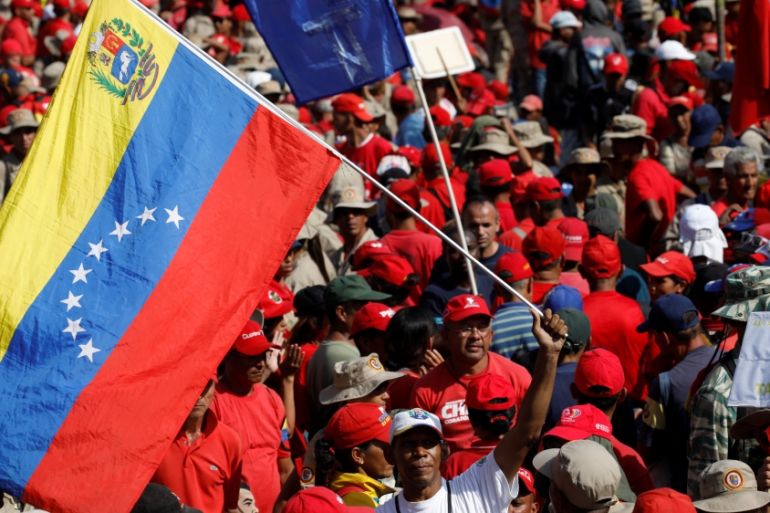US imposes Venezuela-related sanctions on two companies, tankers
The sanctions are part of series of economic measures the Trump administration has taken to cut oil revenues to Maduro.

The United States blacklisted on Friday two new shipping companies and two oil tanker ships for shipping oil from Venezuela to Cuba, the US Treasury Department said.
The sanctions are part of a series of economic measures the Trump administration has taken to cut oil revenues to Venezuelan President Nicolas Maduro in an effort to help push him from power.
Keep reading
list of 4 itemsVenezuela opposition figure Guaido in Colombia ahead of summit
Venezuelan court issues warrants for new opposition leaders
Venezuelan government, opposition to resume political talks
The US Treasury identified the firms as Monsoon Navigation Corporation, based in the Marshall Islands, and Liberia-based Serenity Navigation Ltd.
Monsoon’s tanker Ocean Elegance and Serenity Maritime’s Leon Dias delivered crude oil from Venezuela to Cuba from late 2018 through March 2019, the Treasury Department said. Both tankers have Panama flags.
The sanctions block the firms and ships from dealings with US persons and companies, and freeze any assets the firms may own or control in the US.
The US and most Western nations back Juan Guaido, an opposition leader who invoked Venezuela’s constitution in January to declare himself president, arguing Maduro’s 2018 re-election was illegitimate.
Despite severe oil sanctions on the oil-rich OPEC member nation, Maduro has held on to power, backed by Cuba, Russia and China, and has thus far retained the support of the country’s military and other institutions. Maduro has called Guaido a US puppet.
Venezuelan opposition legislators on Friday said threatening messages had been spraypainted on their homes or intelligence agents have been following them, amid a broad crackdown by the government of President Nicolas Maduro against congress.
The country’s top court this week accused 10 legislators in the opposition-run legislature of treason for participating in a failed April uprising against Maduro’s government, and security forces on Wednesday arrested the second-highest ranking legislator, Edgar Zambrano, who has been transferred to a jail at the Fuerte Tiuna military base in Caracas, according to a statement by the court in charge of Zambrano’s trial.
Further arrests could cripple the functioning of the legislature, which has been a crucial part of the opposition’s strategy to unseat Maduro amid a hyperinflationary economic collapse that has fueled an exodus of millions of citizens.
Reopening some borders
Meanwhile, a Venezuela official said on Friday the country is reopening its borders with Brazil and the Caribbean island of Aruba, which were closed in February.
“We want to convert it into a peaceful border region,” said Venezuela’s Economy Vice President Tareck El Aissami.
El Aissami said in a state television address on Friday that the government has “received assurances that our sovereignty will be respected and that there will not be interference in matters that should be dealt with by Venezuelans.”
El Aissami did not specifically reference the maritime and air borders with the other nearby Dutch Caribbean islands Curacao or Bonaire, or the land border with neighbouring Colombia, which were also closed in February.
Without mentioning Colombia, El Aissami said other borders would remain closed “until the positions of hostility and aggression are ceased.”